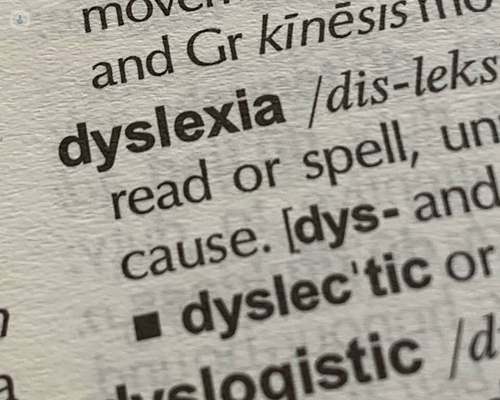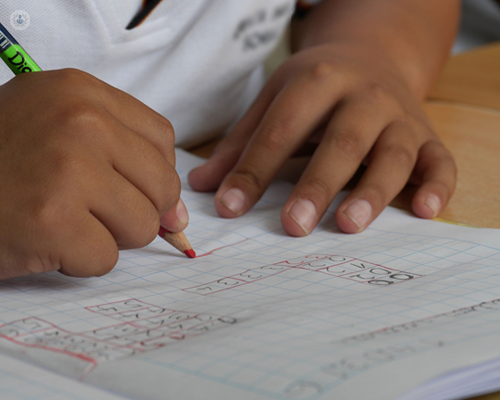Dyslexia
Mr Richard Hewitt - Paediatric otolaryngology
Created on: 11-13-2012
Updated on: 05-24-2023
Edited by: Karolyn Judge
What is dyslexia?
Dyslexia is a learning difficulty, which is characterised by the patient having trouble with reading, writing, and spelling. It is thought the condition stems from a problem in the brain’s language processing. Unlike a learning disability, dyslexia does not affect intelligence, hence its categorisation of “specific learning difficulty” – in fact, many patients with dyslexia have high IQs and excel in certain areas of academia and, indeed, life. It is usually diagnosed during childhood, when a child who otherwise seems to have a normal level of intelligence encounters difficulties at school, particularly with reading.
Leading paediatric consultants treat dyslexia, and you can arrange an appointment with them via their Top Doctors profiles.

What are the symptoms of dyslexia?
Dyslexia is usually diagnosed in children at school, when their difficulties become apparent. Typical signs of dyslexia include:
- Reading and writing slowly;
- Mixing up the order of letters when writing;
- Writing letters back to front (confusing 'b' and 'd' is a common example);
- Understanding verbal information, but struggling with written information;
- Poor and/or inconsistent spelling – this may include spelling everything phonetically;
- Difficulty recognising or making sense of sounds (phonemes);
- Difficulty carrying out a series of instructions;
- Difficulty with planning and organisation.
Many dyslexics complain that the letters 'move' when reading them. It can sometimes appear that the child has problems with vision, but eye exams will reveal that the problem is not in the eyes.
It can often be difficult to diagnose a child with dyslexia, as dyslexic children can be aware of and embarrassed about their difficulty, and may compensate by playing the class clown. Others may become frustrated and/or disinterested, or appear to 'zone out' and daydream a lot, all of which can lead the teacher to see it as a behavioural problem, rather than a learning difficulty.
In many cases, dyslexia is associated with attention deficit hyperactivity disorder (ADHD), dyscalculia (difficulty with numbers), dyspraxia, and poor short-term memory. Children with dyslexia can correctly understand stories or oral discourses and in the vast majority of cases their level of intelligence is totally within normal limits for their age. The symptoms of this disorder usually manifest when the children are in the early years of primary education.

Causes of dyslexia
Exactly what causes dyslexia is not fully understood. It is believed that there are both genetic and environmental factors involved, and in some cases, it seems to run in families.
How is dyslexia diagnosed?
There are a number of factors considered in the diagnosis of dyslexia. These are:
- Reading and other academic tests;
- Neurological tests;
- Questionnaires for the person with dyslexia, their caregivers or teachers;
- Psychological evaluation both for the person with dyslexia and their caregiver;
- Educational and developmental issues, as well as medical history.
There is no one test that can diagnose dyslexia.
Can dyslexia be prevented?
Due to the lack of information about what causes dyslexia, it is not possible to take measures to prevent it. However, the earlier the diagnosis, the quicker the child can receive help.
How to manage dyslexia
Once diagnosed with dyslexia, it is important to cater to the child’s special educational needs. Most educational interventions focus on phonological skills (the ability to recognise, differentiate, and understand different sounds). Special teaching assistants may be able to help dyslexic children with tasks set by the class teacher, and by teaching in a “multisensory” way, it will also help the child to learn. Another recommended method is educational therapy in which the child is taught to develop strategies to resolve their difficulties and manage their frustration.

It is a good idea for parents to encourage their child to read, whether that involves reading to them or with them, supporting them until they are able to read on their own. It is important to make reading fun for your child, reading books that cater to their interests. Repeating the same books can also help to reinforce learning.
In teenagers and adults, working with computers can be beneficial due to a more interactive visual environment, the aid of word processors, text-to-speak functions, and software that can prove more engaging than traditional teaching methods. It is important to inform your employer if you are dyslexic, as they are required by law to make appropriate adjustments to your work environment.
Which medical specialist treats dyslexia?
There are various medical specialists that treat dyslexia. These include:
- Speech language pathologists;
- Neuropsychologists;
- Special education teachers;
- Psychologists;
- Reading specialists;
- Neurologists.


